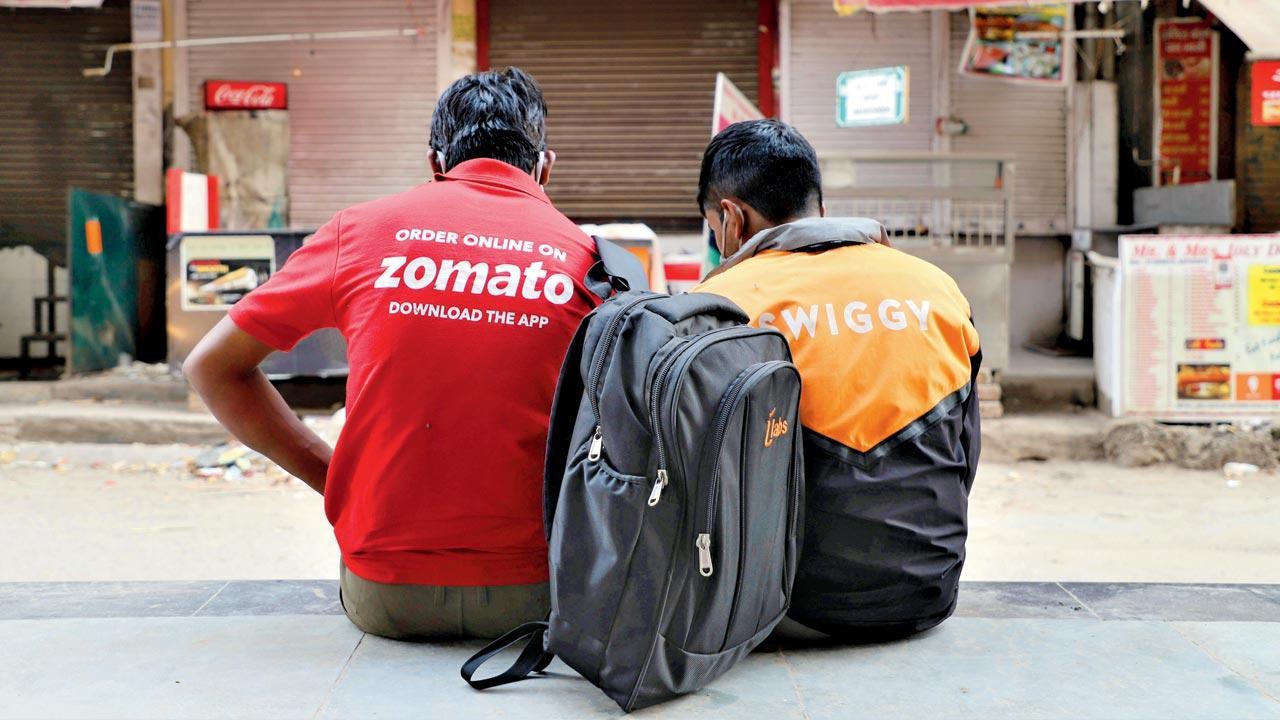New research finds over 90 per cent consumers saying that aggregators must prioritise discussing shared concerns of their gig workers over chest-thumping about their deliveries being the fastest

For the first time, a report on the state of gig workers in India discusses what the consumer feels about their working conditions. Pic/Getty Images
In August, Rajasthan became the first Indian state to pass a dedicated law to protect the interests of gig workers. The Platform-Based Gig Workers (Registration and Welfare) Act, 2023 makes it mandatory for all gig workers—men and women employed by services like food or grocery delivery, transport and speedy courier services—to be registered with the government so that they can enjoy the benefits of labour laws. The Act was hailed as groundbreaking because, according to many, services that employ such labour have for too long gotten away with exploitative policies, thanks to legal gray areas.
ADVERTISEMENT
Now, in a recent report by Fairwork India, it has come to the light that even the consumer is waking up to the plight of the gig workers.
The research, led by the Centre for Information Technology and Public Policy (CITAPP) at the International Institute of Information Technology Bangalore (IIITB) along with the Oxford Internet Institute at the University of Oxford, has noted that 80 per cent of consumers in 12 Metro cities, including Mumbai, have said that are aware that platform workers work long hours.
For the last five years, the annual report has rated platforms such as BigBasket, BluSmart, Swiggy, Urban Company, Zomato, Zepto, flipkart, Amazon flex, Dunzo, Uber, Ola, and Porter, based on working conditions based on the International Labour Organisation (ILO) as well Indian labour laws. This year, the researchers decided to ask the consumers what they thought. In their survey, 91 per cent of the consumers agreed that platforms must discuss the shared concerns of the workers, which are increasingly gaining limelight.
Janaki Srinivasan Associate Professor, International Institute of Information Technology Bangalore (IIITB) says that the inclusion of consumers was a conscious choice, but the focus still remains on the gig workers. “In 2017 and 2018, the conversation was about generation of jobs or innovation of the platforms or convenience of consumers, but very little was said of the working conditions of the those in these jobs. It may have been so because a lot of these platforms had just started back then, and there was a lot of incentives for workers in the beginning,” she explains. “It is only very recently that the push back from both the workers and the consumers has been observed.”
Especially on social media, consumers are seen being increasingly vocal about the plight of gig workers. The common man is seen routinely posting about stories shared by their friends, or simply by the exhausted looking young man who just dropped their dinner off.
The push back from the workers has largely been about how they are rated and the lack of data for how much work is being allocated, the route picked for the delivery and the workers being banned from working if their ratings drop.
According to a report published in September by the East Asia Forum, a think tank that looks at economics, politics and public policy in East Asia and the Pacific, India has an excess supply of working-age individuals, with a median age around 28 years. The report quotes the government’s Periodic Labour Force Survey data for 2021 to 2022 to say that the unemployment level remains stagnant at 8.8 per cent and has not changed much since 2017.
“This is not surprising as many young workers lack technical education and tertiary level certificates—only 1.3 per cent of Indians has a technical education and only 0.7 per cent has a graduate certificate in vocational education. The alternative is low-paid gig work. An estimated 7.7 million people relied on such jobs as of 2020 and this figure is estimated to increase to 23.5 million by 2030,” says the report by Nilanjan Banik.
Bilahari M, the head researcher for Fairwork’s report, says that the recent pledges by the platforms to take the workers’ aggregate rating for their the last 150 jobs is what they will be monitoring closely for the next year. “This would mean that the workers do not have to spend long hours waiting for a gig, as their ratings would not go down based only on a handful of bad ratings. Workers have been known to work without pay in order to get back to their previous ranking,” he says. Fairwork’s report rates the companies based on five principles: fair pay, fair conditions, fair management, fair contracts and fair representation.
The gig workers are also currently fighting a case in the Supreme Court to be recognised as employees and not just partners or self-employed. The aim is getting
platform workers to pay welfare on each transaction and reach an understanding of minimum wage for the long hours that the workers are putting in.

Ratings based on the five principles
Big Basket 6/10
BluSmart 5/10
Swiggy 5/10
Urban Company 5/10
Zomato 5/10
Zepto 4/10
Flipkart 3/10
Amazon flex 2/10
Dunzo 1/10
 Subscribe today by clicking the link and stay updated with the latest news!" Click here!
Subscribe today by clicking the link and stay updated with the latest news!" Click here!







